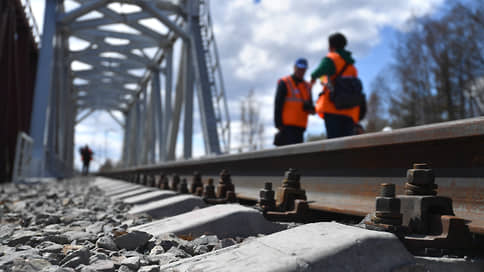Points are shifting near the Eastern polygon – Newspaper Kommersant No. 175 (7376) of 09/22/2022
[ad_1]

Consumers of Russian Railways services are asking to prevent another shift in the commissioning of some key points of the first stage of the Eastern test site. Formally, the facilities have already been built, but they have only been put into temporary operation or have not been finally put on balance, which does not allow organizing the passage of the required number of trains through them. At the same time, JSC Russian Railways assures that the planned carrying capacity of 158 million tons will be achieved by the end of the year. Analysts point out that the plan is largely implemented not through new construction, but through better traffic management, and these results should not be confused.
On September 6, the Council of Consumers of JSC Russian Railways issued an expert opinion on the monopoly’s proposals to postpone the planned deadlines for reaching control points as part of the project to expand the Eastern Range (Kommersant saw both documents). The fact is that Russian Railways proposes to shift the deadlines for the commissioning of some priority facilities, on the commissioning of which consumers insist. For seven facilities of the first stage of expansion, which should be completed this year, we are talking about a shift of 5-16 months: including the Kholodnikan and Okurdan sidings will be commissioned on November 30 instead of June 30, and the construction of the second track on the Sakukan-Sallikit stretch has been shifted from June 30 to October 30, 2023. Also among the objects being moved are the second tracks on the Balbukhta-Syulban, Eldigan-Tudur sections, the construction of a double-track insert on the Shturm-Gorely section, the second stage of the reconstruction of the Ussuriysk station.
Nine objects of the second stage are shifted to 2023, mainly to its end. The consumer council insists that the transfer of priority objects of the first stage should be limited to the first quarter of 2023: a stronger shift means the risk of rescheduling the commissioning and subsequent objects of the second stage due to a possible shortage of labor and technical resources. In a previous opinion dated August 1, the Consumer Council insisted that the priority objects of the first stage be reflected in the traffic schedule from January 1, 2023.
Andrey Makarov, Deputy General Director of Russian Railways, told the EEF that a little more than 15 objects remained for the first stage of the BAM and Trans-Siberian Railway this year. “Of the 15 objects that we, together with the Council of Consumers, are monitoring, in May we commissioned the Shmakovka traction substation, which limited the traffic interval on the approaches to Smolyaninovo, and in June opened traffic on the second tracks of the Balbukhta-Syulban, Eldigan-Tudur haul,” he said. .— After the forum, we are planning a large switchover and putting into temporary operation of the Ussuriysk station, the Selikhin station – that is, the main bottlenecks that hinder the movement of coal to the ports, what was planned for the volume of 144 million tons, which we achieved before the implementation of all measures through technological measures.
The facilities of the first stage, which provide the target increase in carrying capacity, have been built, Russian Railways notes. “On the indicated hauls, the working movement of trains has been launched,” they explain in the monopoly. “The postponement is of a formal nature.” Adjustments for the second stage are associated with a reduction in the investment program of JSC Russian Railways in 2022, “at the same time, it is planned to carry out all priority measures that directly affect the carrying capacity,” Russian Railways adds. At the same time, the monopoly assures that by the end of 2022, the carrying capacity of 158 million tons will be achieved.
A source familiar with the progress of work says that the contractor has completed construction and installation work on the construction of the second track on the Balbukhta-Syulban stretch, and to commission the facility, it is necessary to wait for the delivery of the missing equipment. The work on the second stage of the Ussuriysk station is linked to the work schedule of the directorate for the repair of the track of JSC Russian Railways (works on laying ballast and erecting the superstructure of the track), complicating the construction progress, the need to perform work in the “window”. After the completion of all the works of the PDD, the commissioning of the second track on the Eldigan-Tudur stretch will also be carried out. For the construction of the Kholodnikan siding, the contractor is eliminating the comments of the working commission, the work on the installation of the superstructure of the track is being completed by the PDC, earlier there was a delay in the delivery of equipment. However, Kommersant’s interlocutor also assures that almost all objects of the first stage of the BAM have already been put into operation under a temporary scheme or full commissioning. The final commissioning of all objects of the first stage of the BAM is planned before the end of the year.
The head of Infoline-Analytics, Mikhail Burmistrov, says that in terms of expanding the Eastern range, the task is vague: the monopoly is required to transport a certain number of tons, but it doesn’t matter how. Russian Railways, he says, uses numerous technological solutions, such as virtual coupling, depersonalization of the gondola car fleet for loading and unloading coal, integrating its IT systems with port systems, and so on. However, technological measures should not be confused with the results of construction, he notes, because if everything was built, we would have additional millions of tons to the designated parameters. The money is allocated for construction and should go to physical debottlenecking, and not virtual, the expert believes, and the results of the activities of Russian Railways as an infrastructure company should not be mixed with its activities as a carrier company.
[ad_2]
Source link





